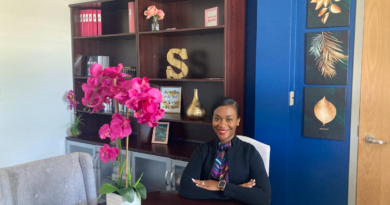New class shines light on equality
New sociology-based Equity in Education course taught by NSL Government teacher Deb Delavan helps students recognize problems within today’s school systems through reflecting, connecting, and observing their past educational experiences.
Equity in Education is a full semester course open to all grades. Ms. Delavan developed the course using different methods and education theories that help transform the classroom based on her experience advising the Minority Scholars Program and independent study in University of Maryland’s PhD program.
“We [want to] look at education not for just what it is, but what it can be,” Ms. Delavan says about her hopes for the class, “I want them to dream about that . . . and hopefully get involved in doing something about that.”
Since Equity in Education is a self-made course, it allows Ms. Delavan to have freedom and creativity with her curriculum. Her curriculum is not based on testing or lectures, but on readings, videos, hands-on activities, and mostly discussion. “[In groups,] we get to learn about ourselves and . . . know about the key education points,” says senior Stephanie Milagros Ortiz.
The class starts with a focus on currere, a process developed by curriculum theorist William Pinar, encouraging students to reflect and discuss their past experiences, both good and bad, in education. “We’re trying to build . . . a community where we understand a little bit where each other’s coming from,” Ms. Delavan says.
Afterwards, the class explores what equal educational opportunities mean and how policies are made. The class observes how factors such as race, gender, and privilege, and how issues like standardized testing and poverty in education create an educational gap between students.
Ms. Delavan also lets her students play a role in deciding the next step for the class, encouraging student input on how to thoroughly discuss each topic in the curriculum. “She’s . . . not very strict about a certain way of teaching the class or a certain way of how the day should look,” sophomore Dilini Ranasona says.
Meanwhile, the most challenging part of the course for students is their level of vulnerability. “You have to be open about sharing your opinions with people you don’t know,” Ranasona says.
However, students in Equity in Education highlight that the class is open to different perspectives, as well as Ms. Delavan’s teaching.“Her grading is actually fair as opposed to there’s only one right answer,” sophomore Emma Cooper says. “She lets people share their ideas . . . she accepts it and lets other people talk.”
“I feel like it’s a free flow of communication . . . and it just great to know that she’s always going to support you no matter what.” junior Yordana Ribeiro says.



